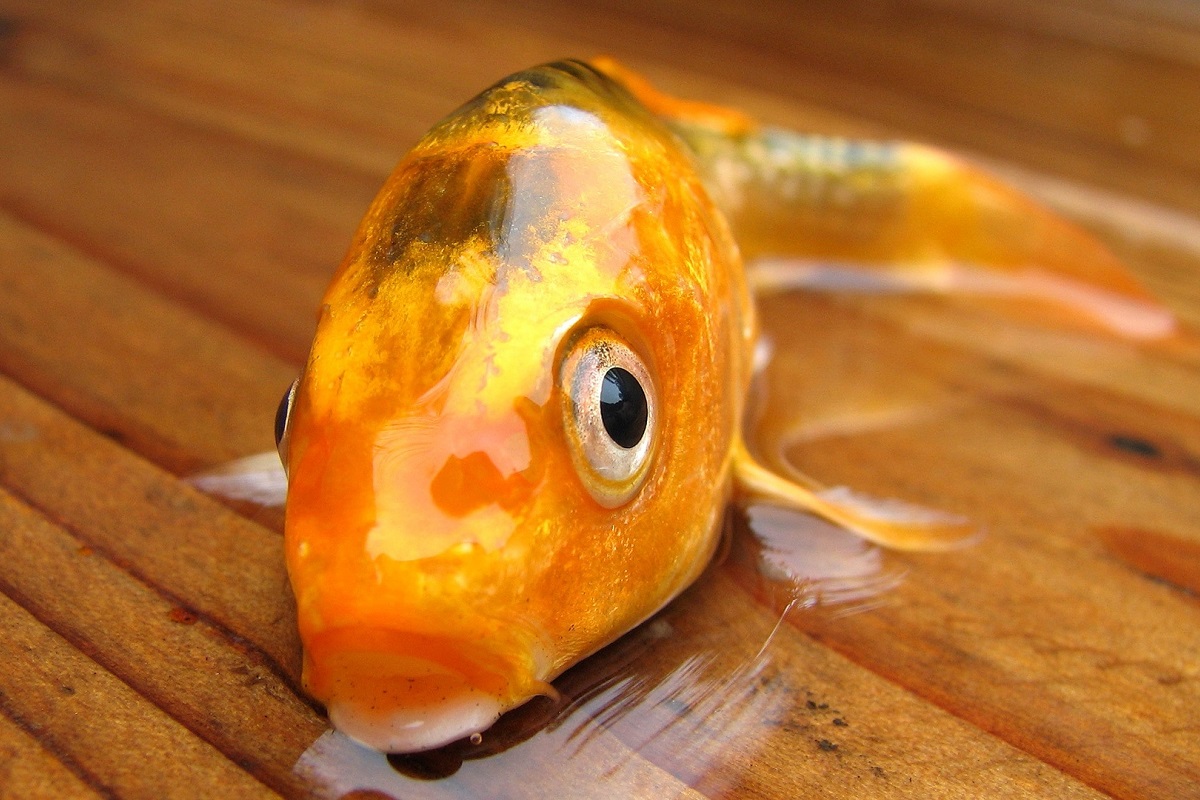Reeling in a big catch is any angler’s dream come true, but unless you’re planning on preserving that fish or eating it, you’ll likely toss it back into the water.
Still, you’ll need to carefully time your pictures to ensure the fish doesn’t suffocate while above water.
But, of course, this begs the question, “How long can fish live out of water?”
This guide will answer this question and discuss how a fish’s species affects its ability to survive out of water.
Contents
How Do Fish Breathe in the Water?
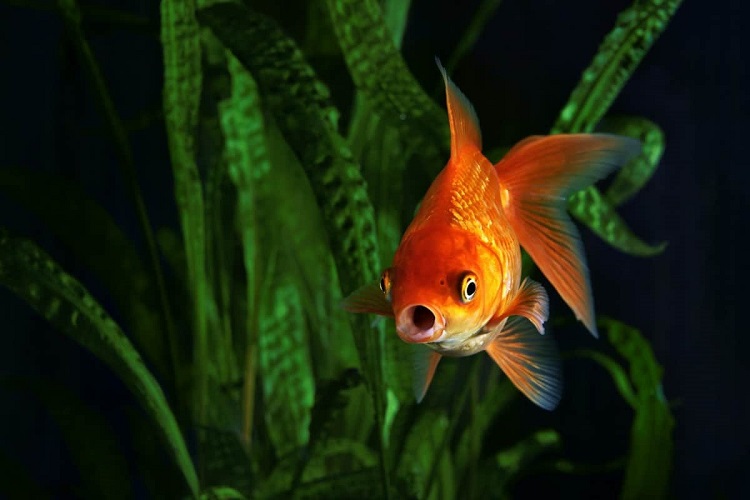
A fish’s gills allow it to breathe underwater. When a fish opens its mouth, water passes through the gills on either side of its head.
These gills absorb dissolved oxygen in the water, allowing the remainder to pass through and back into the surrounding environment.
Gills can do this because they’re jam-packed with tiny blood vessels. These blood vessels make it easy for oxygen to pass into the fish’s bloodstream.
Notably, this process also involves the transfer of carbon dioxide (CO2), allowing fish to take in oxygen while excreting harmful gases. This process of respiration is very similar to the way that humans breathe.
The only difference is that our lungs perform this feat, while it’s the gills in a fish!
Still, just as humans don’t have the proper anatomy to absorb dissolved oxygen in water, most fish don’t have the right body parts to breathe dissolved oxygen from the air.
For this reason, the vast majority of fish can’t survive very long out of water. However, a few species of fish find it easier to breathe above water.
Unfortunately, there are also a handful of different species that are particularly sensitive to out-of-water conditions. Let’s explore these groups in more detail.
How Long Can a Fish Survive Out of Water?
The amount of time a fish can survive out of water varies depending on the species of fish.
Generally, freshwater fish have the shortest out-of-water survival time.
Amphibious fish and saltwater fish can survive far longer when out of water. Let’s look at some different types of fish to understand these differences.
Pet Fish
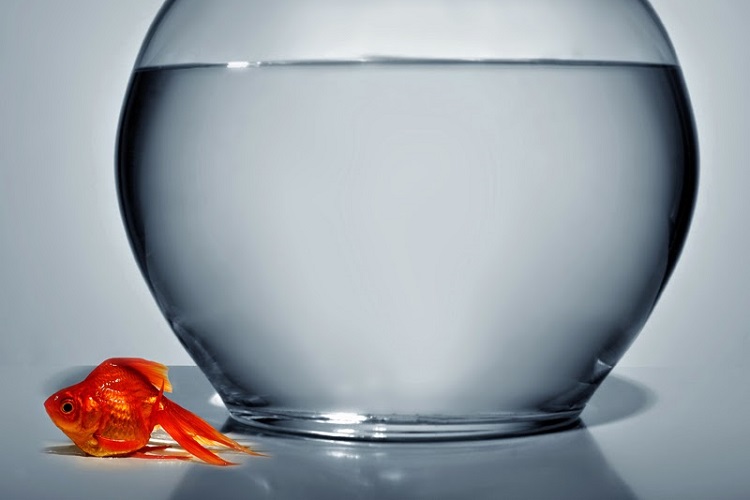
Pet fish typically have the shortest out-of-water survival time. But the average goldfish can survive for up to one hour outside its tank.
Other types of pet fish, like betta fish, can survive up to two hours outside of water. But some of the most petite types of aquarium fish, like neon tetras and guppies, can only survive out of water for ten minutes!
Generally, freshwater fish have a maximum out-of-water survivability time ranging between ten minutes and one hour. For this reason, you’ll need to be careful when removing them from water for transport or catch-of-the-day pictures.
It’s crucial to note that fish struggle to breathe out of the water, slowly suffocating as their oxygen levels drop. This experience can be painful for the fish, so minimizing a pet fish’s time outside of the water is crucial.
Amphibious Fish
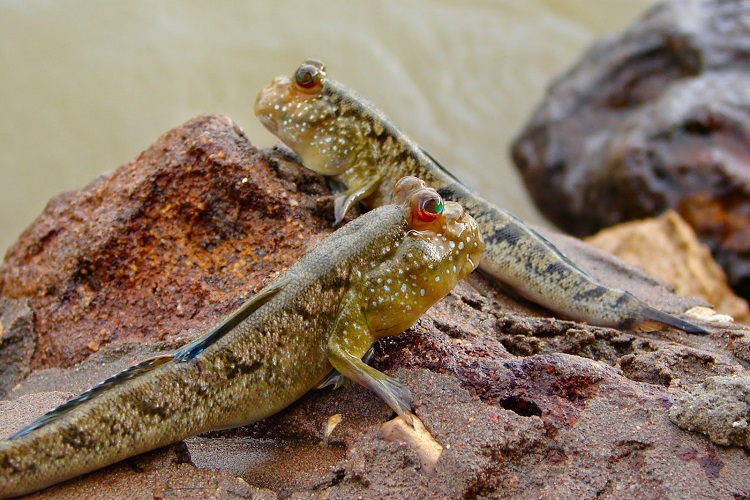
Amphibious fish can survive out of water longer than most types of fish.
Mudskippers and lungfish are two of the most common types of amphibious fish, though mudhoppers are also part of the amphibious group.
Often called air-breathing fish, amphibious fish have physical adaptations for breathing using gills, skin, or modified air bladder respiratory systems. Some of these fish even have lungs capable of taking in dissolved oxygen in the air.
Snakehead fish are freshwater fish that are partially amphibious, with small-yet-powerful pectoral fins that allow them to travel short distances across dry land. These fish can survive up to four days outside of water and indefinitely in low oxygen swamps and rivers.
While they’re out of the water, these fish can snack on birds, reptiles, and small mammals. They have several sharp teeth that allow them to devour their prey quickly, making them one of the most intimidating amphibious fish species.
Some types of fish live in partially saltwater environments, also called brackish water. For example, the mangrove rivulus (also called the mangrove killifish) lives in brackish waters in mangrove swamps.
This fish can live up to two months outside of the water! Consequently, it has the highest dry land survivability time of any fish.
Large Ocean Fish
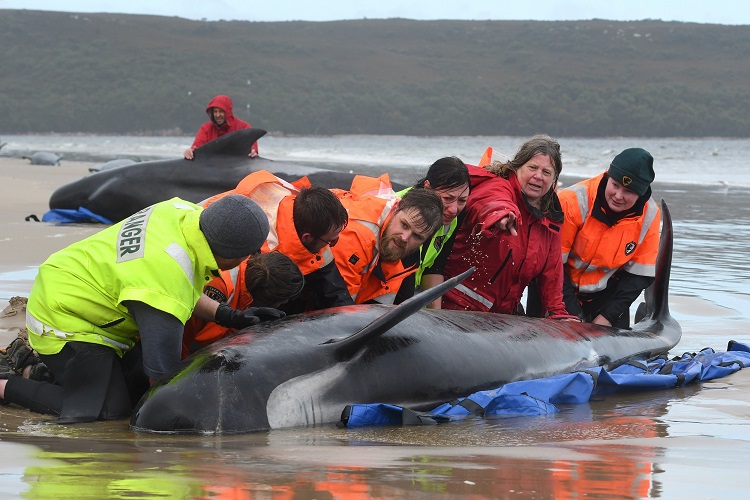
Large saltwater fish can sometimes survive for several hours outside of water. This is partially due to their larger body size, which allows them to maintain oxygen levels for more extended periods than smaller fish.
The most enormous aquatic creatures on Earth, blue whales, can only survive out of water for a few hours.
For that reason, environmental agencies have to work quickly to return these animals to the ocean after they’ve become beached.
However, other large ocean fish, such as whale sharks, can’t live outside of water for more than thirty minutes to an hour. That’s because these fish, while still quite large, are much smaller than blue whales.
Walking Catfish
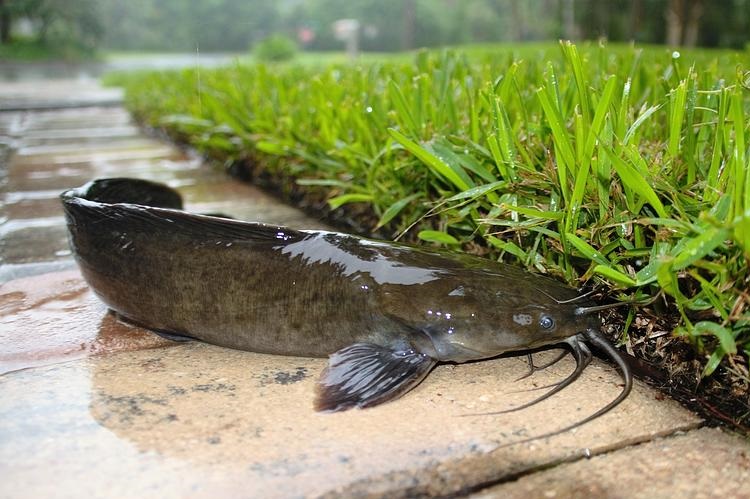
The walking catfish is one of the most infamous types of amphibious fish. They can breathe out of the water and use their pectoral fins to wiggle around on dry land.
Though they can only survive up to about 18 hours outside of water, they can travel more than half a mile across the land! These fish can also survive various climates, including hot asphalt parking lots.
Because these fish can travel relatively long distances across dry land and survive several hours outside of aquatic environments, they’re considered invasive species.
Unlike other invasive fish species, these creatures transport themselves to new habitats without human intervention.
Conclusion
Fish can live out of water for between ten minutes and two months, depending on the species.
Typically, amphibious and brackish water fish can survive far longer out of the water than freshwater fish species.
Neon tetras and guppies can’t survive for more than ten minutes when out of their tanks.
Still, the mangrove killifish (and a few other types of tropical fish) can survive several weeks or months outside of water thanks to their variable metabolic rate.

Ian Sterling, founder of Fishlab.com, began his aquarium journey over 30 years ago, driven by a deep fascination for fish and their diverse personalities. His website, Fishlab.com, is dedicated to making fishkeeping accessible and enjoyable, offering beginner-friendly guidance, expert insights, and a community for aquarists to connect and share experiences.


